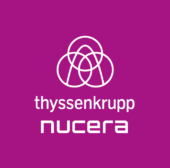Expansion to 5 gigawatts of annual production capacity: thyssenkrupp represented in all three BMBF hydrogen lead projects

- H2Giga: thyssenkrupp is driving forward the industrialization of alkaline water electrolysis through automated series production
- H2Mare: thyssenkrupp tests the offshore production of green methanol and ammonia
- TransHyDE: thyssenkrupp tests ammonia cracking
With the hydrogen lead projects – its largest research initiative to date on the topic of energy transition, the German Federal Ministry of Education and Research (BMBF) is supporting Germany’s entry into the hydrogen economy. thyssenkrupp is involved in all three hydrogen lead projects and is testing the industrial production, use and system integration of green hydrogen. Within four years up to 2025 thyssenkrupp will therefore be further expanding its technology leadership along the entire green chemicals value chain. This involves the series manufacturing of large-scale water electrolyzers (H2Giga), the production of synthetic fuels, green ammonia, green methanol and synthetic methane at sea (H2Mare), as well as hydrogen transport and conversion technologies such as ammonia cracking (TransHyDE). These flagship projects will bundle the expertise for hydrogen technologies in science, industry and civil society throughout Germany, thereby providing the initial spark for the development, conception and implementation of hydrogen solutions on an industrial scale.
H2Giga: Upscaling of water electrolysis to automated gigawatt series production
thyssenkrupp will be receiving almost 8.5 million euros in subsidies for the research and development of the large-scale production of alkaline water electrolysis (AWE). The aim on the one hand is to take advantage of scaling effects and thereby be able to reduce the manufacturing costs. On the other hand, an expansion of the existing supply chain of 1 gigawatt (GW) of electrolysis cells enables larger project volumes to be implemented, so that several gigawatt projects can be implemented at the same time each year.
Martina Merz emphasizes the need for this research initiative: “We have seen a significant shift in the project sizes towards several hundred megawatts to gigawatts in recent months, so that large-volume and automated series production is already in line with market demand today. For these orders of magnitude, simple upscaling is not feasible, but disruptive approaches have to be applied, which are being developed, tested and optimized in individual steps within the framework of this project.” So, on the one hand, completely new stack and cell development work is being carried out in order to develop the next technology generation of alkaline electrolysis. Furthermore, we are striving to implement the supply chain optimization process required for industrial series production. Through the use of robotics and automation, both the manufacturing and assembly processes are being optimized.
The thyssenkrupp-led H2Giga project “INSTALL AWE” focuses on the industrialization of AWE, which is today the furthest developed market-ready technology and used above all for large-scale industrial applications. The modular and standardized 20 MW module from thyssenkrupp is also advantageous in terms of economic aspects and climate protection. In contrast to the compact construction of PEM electrolyzers, the single-element technology used for AWE enables selective maintenance work to be carried out on individual cells instead of having to replace the entire stack. This conserves resources and reduces the operating costs. Essential for this ramp-up to series production is the core relationship with the Joint Venture partner Industrie De Nora, a globally renowned specialist in electrochemistry and high-quality supplier for cell manufacturing and coatings. The fully integrated workflow between thyssenkrupp and De Nora, their proven set-up gigawatt supply chain for water electrolysis cells and global service workshops is the strong basis for this next development step. For this purpose, thyssenkrupp will be working together with its long-standing partners like De Nora and Hoedtke GmbH & Co. KG, as well as scientific partners, but will also be building on new collaborations. In the H2Giga innovation pool with institutions, universities and small specialized companies offering scientific and technical skills with respect to the subject of series production, investigations of broader research and development topics are being carried out which are also intended to further drive forward thyssenkrupp’s own development.
About the hydrogen lead projects:
Funded by the German Federal Ministry of Education and Research. Over 240 partners from science and industry are working together in the hydrogen lead projects. This spring, the projects were launched on the basis of non-binding funding prospects. The funding will amount to around 740 million euros in total. More information is available at wasserstoff-leitprojekte.de.
Investor inquiries:
Dr. Claus Ehrenbeck
thyssenkrupp
Head of Investor Relations
Phone: +49 201 844 536464
Email: claus.ehrenbeck@thyssenkrupp.com
About thyssenkrupp Uhde Chlorine Engineers:
thyssenkrupp Uhde Chlorine Engineers offers world-leading technologies for high-efficiency electrolysis plants. The company, a Joint Venture with Industrie De Nora, has extensive in-depth knowledge in the engineering, procurement, and construction of electrochemical plants and a strong track record of more than 600 projects with a total rating of over 10 gigawatts already successfully installed. With its water electrolysis technology to produce green hydrogen, the company offers an innovative solution on an industrial scale for green value chains and an industry fueled by clean energy – a major step towards a climate-neutrality.

Katharina Immoor
Spokesperson
Phone: +49 172 1492542
Email: press@thyssenkrupp-nucera.com
Would you like to join our press mailing list?
Send us an email to press@thyssenkrupp-nucera.com with the subject „Press Releases“ and always receive the latest news!


More press releases

